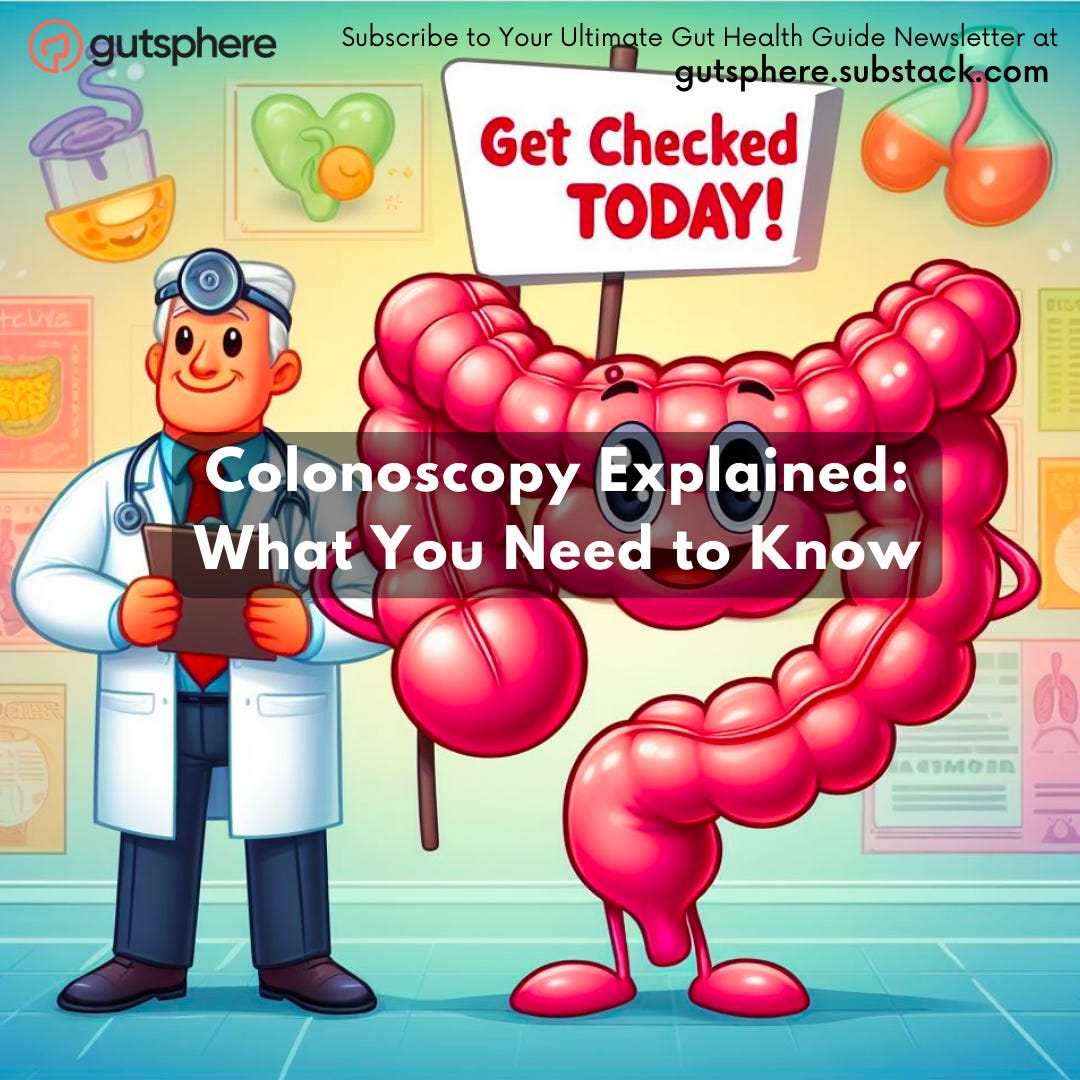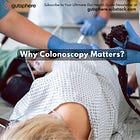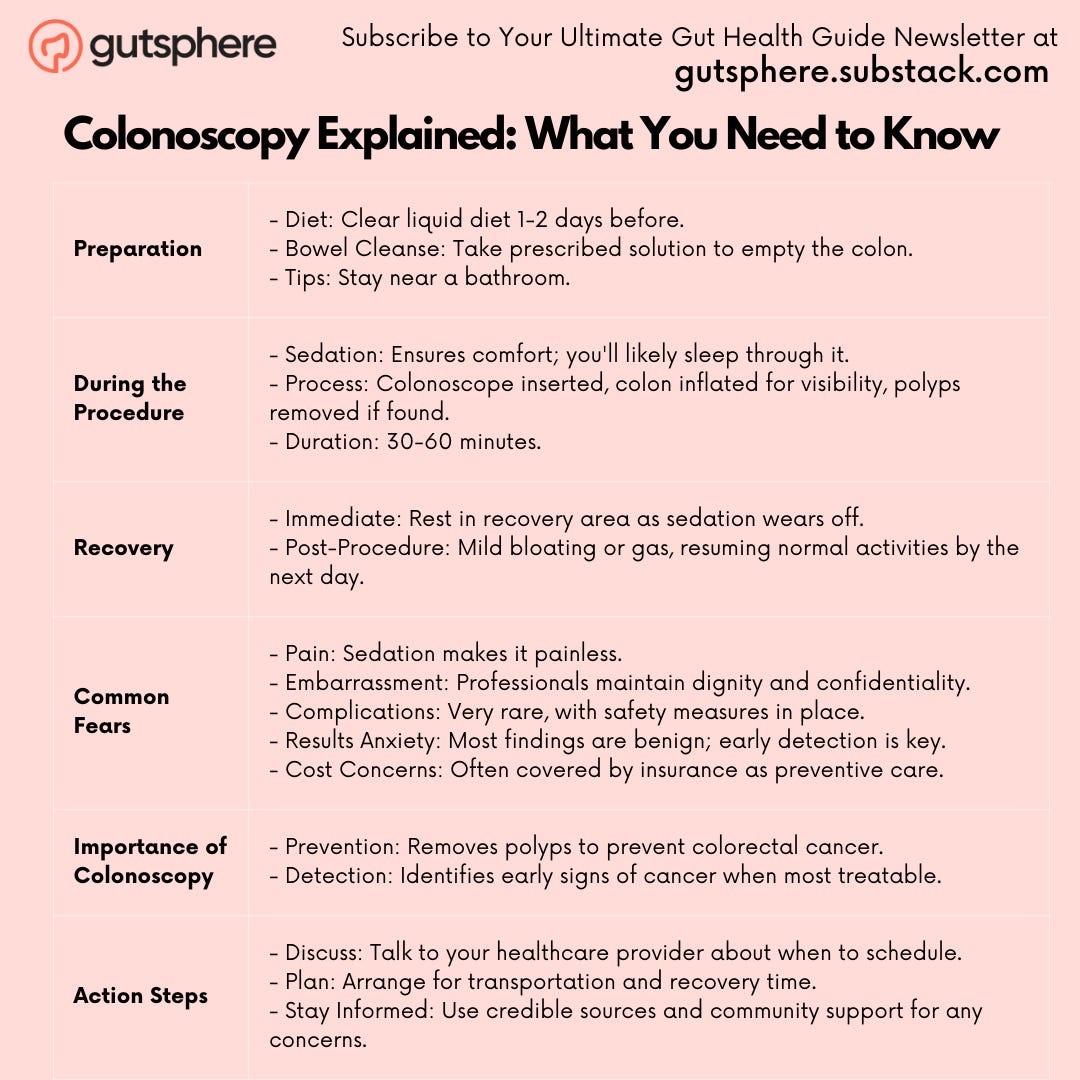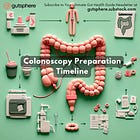Colonoscopy Explained: What You Need to Know(Part 2/10)
Here, we delve into what colonoscopy is, how it's performed, and what patients can expect during and after the procedure.
Previous
Hello, Everyone!
Welcome, dear members of the Gutsphere community, to the second edition of our informative series. Today, we dive deep into the world of colonoscopies, aiming to demystify the procedure from preparation to recovery, and to address every question and concern you might have. Our goal is to arm you with knowledge, dissipate any fears, and debunk widespread misconceptions.
Understanding Colonoscopy
Colonoscopy is a medical procedure that allows doctors to examine the interior surfaces of the rectum and colon. Using a flexible tube equipped with a light and camera (colonoscope), doctors can detect inflamed tissue, ulcers, and abnormal growths. It is the most effective method for colorectal cancer screening, capable of detecting and removing polyps before they have the chance to turn into cancer.
The Procedure: A Closer Look
Preparation: The First Step to Success
What to Expect: Preparation involves a clear liquid diet and taking a bowel cleansing solution the day before your procedure. This prep is crucial as it clears the colon, providing a clear view for examination.
Common Fears and Misconceptions:
Fear: The prep solution tastes bad and is hard to consume.
Reality: While not delicious, flavor improvements and tips like chilling the solution or using a straw can make it more palatable.
Fear: The cleansing process is uncomfortable.
Reality: While frequent trips to the bathroom are expected, considering it a cleansing process can frame it in a positive light. Modern prep solutions are designed to minimize discomfort.
During the Procedure: Understanding the Process
What to Expect: You'll be sedated, ensuring comfort throughout the procedure. The colonoscope is gently inserted into the rectum, air or carbon dioxide is introduced to inflate the colon for better visibility, and the camera transmits images to a monitor.
Common Fears and Misconceptions:
Fear: The procedure is painful.
Reality: Thanks to sedation, most patients feel nothing during the procedure. Post-procedure discomfort is minimal and manageable.
Fear: The idea of being sedated is frightening.
Reality: Sedation is closely monitored by healthcare professionals, ensuring your safety and comfort throughout.
Recovery: What Happens After
What to Expect: Post-procedure, you'll spend time in the recovery area as the sedation wears off. It's normal to feel groggy, and you might experience mild cramping or bloating, which quickly dissipates.
Common Fears and Misconceptions:
Fear: Recovery from the procedure is long and painful.
Reality: Most patients resume normal activities by the next day. Any discomfort is mild and temporary.
Addressing Common Fears and Misconceptions Step by Step
Embarrassment About the Procedure:
Reality: Medical professionals conduct these exams daily, treating them with professionalism and confidentiality. Your dignity is preserved throughout.
Fear of Complications:
Reality: Serious complications, like perforation or significant bleeding, are exceedingly rare. The benefits of early detection and prevention of colorectal cancer far outweigh these minimal risks.
Anxiety Over Results:
Reality: While waiting for results can be stressful, remember that colonoscopies can prevent cancer by removing polyps before they become malignant. Most findings are non-cancerous, and early detection greatly improves outcomes if cancer is found.
Concerns About Cost:
Reality: Many insurance plans cover colonoscopy screenings, especially for preventive care. Financial assistance programs are also available for those without insurance or with high deductibles.
Misconception: Only Older Adults Need Colonoscopies:
Reality: With the American Cancer Society now recommending screenings start at age 45 for those at average risk, it's clear that midlife is the new target age for beginning these vital screenings.
The Importance of Colonoscopy
Colonoscopy isn't just a procedure; it's a lifesaving intervention. It's the most effective tool we have for colorectal cancer prevention, capable of detecting the disease in its earliest, most treatable stages. By removing polyps before they can develop into cancer, colonoscopies save thousands of lives every year.
In Closing
As we conclude this edition, we hope you feel more informed and less apprehensive about colonoscopies. This procedure plays a crucial role in colorectal cancer prevention, offering peace of mind and the chance to catch potential issues early when they're most treatable. We encourage you to discuss any concerns with your healthcare provider and consider scheduling your screening when the time is right.
Next
Request
Share
Our sincere request to you is to share the newsletter with your friends, family, and community so that they can benefit from the content. Also it will help us grow the newsletter, and eventually, as we release more content, digital tools, and more we will enable people around the world to live chronic disease free.
Subscribe
Feedback
Also, please give us feedback so that we can improve the content. And if there are any topics that you want us to cover please send us your questions and topics. Furthermore, if you try any of the things we provided information please share your experience with us.
Thank You
GutSphere Team
Disclaimer
Please note that the information provided in this newsletter is for informational purposes only and should not be considered as a substitute for professional medical advice, diagnosis, or treatment. If you have any concerns or questions about our health, please consult with a licensed healthcare professional. The information contained in this newsletter is not intended to diagnose, treat, cure, or prevent any disease. The publisher and authors of this newsletter assume no responsibility for any adverse effects that may result from the use of the information contained herein.





